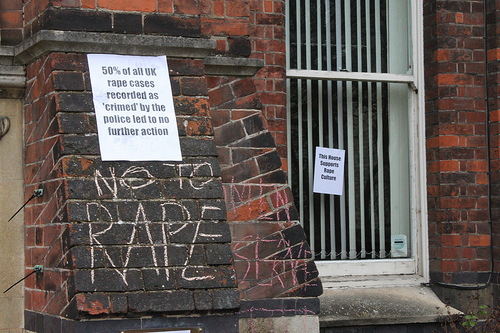By Sasha Moedt (The Cascade) – Email
Print Edition: January 16, 2013
(Trigger Warning: This article contains discussion of rape, sexual assault and sexual violence against women.)
What is rape? The definition of it—on the surface—seems clear: any act of intercourse that is forced upon a person. But the meaning of the word is becoming blurred in the foggy mess that is rape culture.
The phrase “rape culture” has become common in the media with the publicity of several high profile rapes in India. These incidences have sparked an examination of rape our own society. Rape culture is essentially a culture in which rape and sexualized violence is excused, tolerated, normalized and even perpetuated. This is done through everyday means—advertising, TV, movies, music and jokes—things that surround us and bombard us every day.
These images and words aren’t obvious. We aren’t dismissing the rapes portrayed on CSI, and there were no blurred lines in whether it was rape on the bus in New Delhi.
A feminist activist group, FORCE: Upsetting Rape Culture writes on their webpage that dispelling myths about rape is a step that must be taken to progress to a healthier culture: “we have created a cloud of myth around rape to protect ourselves from some uncomfortable truths.”
FORCE are most well known for their campaign “operation panty-drop,” or PINK loves CONSENT. PINK (a Victoria’s Secret line marketed towards high school or collge aged females) features cute little thongs that have embroidered on them “sure thing” and “unwrap me” and various other lines. CONSENT panties, dropped by activists in Victoria’s Secret stores next to PINK panties, read: “ask first” and “no means no.”
Here are some of the myths about rape that are perpetuated in our culture:
She shouldn’t have _____.
Fill it in. Worn revealing attire. Flirted. Had so many drinks. Gone with him alone, worn so much make-up, laughed at his jokes. We love to blame the victim. But what are we saying about men, then, if they cannot even control their sexuality? FORCE writes:
“Rape is not about horny and sex-crazed men who cannot handle themselves. It is about perpetrators who want control so much that they choose to violated and take the control of another person’s body. Rapists are not ‘out of control.’ Rapists are in complete control. Rape is an exercise and demonstration of power.”
And if a man’s sexuality is used as a reason for rape, what does this do for other men?
“Our culture needs models of not only healthy masculine sexuality but also respectful and honest expressions of it. If male sexual desire was demystified and respected, instead of limited and vilified, its expression would come out less often as violence and more often as consensual (and hopefully awesome) sex!”
Let’s not blame the victim in any way. Ever. Let’s not excuse it as natural male sexuality, because it’s not.
She should have ______.
Like the idea that women provoke rape, there seems to be the idea out there that women should prevent rape. One way of doing this is limiting our freedoms. Don’t go out at night. Don’t travel alone. Another way is by, again, pinning the blame on us. So when a woman fails to protect herself, there is shame – she screwed up, she made a mistake.
Boyfriends and spouses have a right to her body.
Once she’s said yes, can she say no? No one ever has the right to your body. Ever. Statistically, rape is almost always perpetrated by someone the victim knows – friends, dates, co-workers, boyfriends and husbands. In the States, only 26 per cent of rapes and attempted rapes are reported to the authorities (US Dept of Justice, 2001). Why? Because the stigma of being a rape victim. The humiliation of who the rapist is, and perhaps in uncertainty.
Rape fantasies mean that some girls out there actually want to be raped.
No. She doesn’t want it. Rape fantasies are an interesting thing – a very common fantasy for women. But the difference between rape fantasies and rape is control and pleasure. In a rape fantasy, the woman is in complete control as to what the man is doing in her fantasy. His desires are hers. The fantasy is about how much he wants her, and how much he wants to pleasure her, per se. A rape, on the other hand is painful, traumatic, and about the rapist’s desire.
Rape is a black and white situation.
It’s mostly grey. Rarely is the rapist a stranger. Rarely does the victim behave as an innocent victim because of the stigma, shame and confusion when someone they trust rapes them, perhaps even during the rape. Rarely is the rape our idea of what rape is, because we forget the definition of rape: any act of intercourse that is forced upon a person.
Imagine a culture where there wasn’t stigma against a rape victim, but the rapist. Where a victim didn’t have to prove they were raped, but the rapist had to prove there was consent. Where the rapist wasn’t a male displaying a strong sex drive, but a male violating someone’s basic rights and committing a crime that is punished accordingly. There are too many blurred lines.


